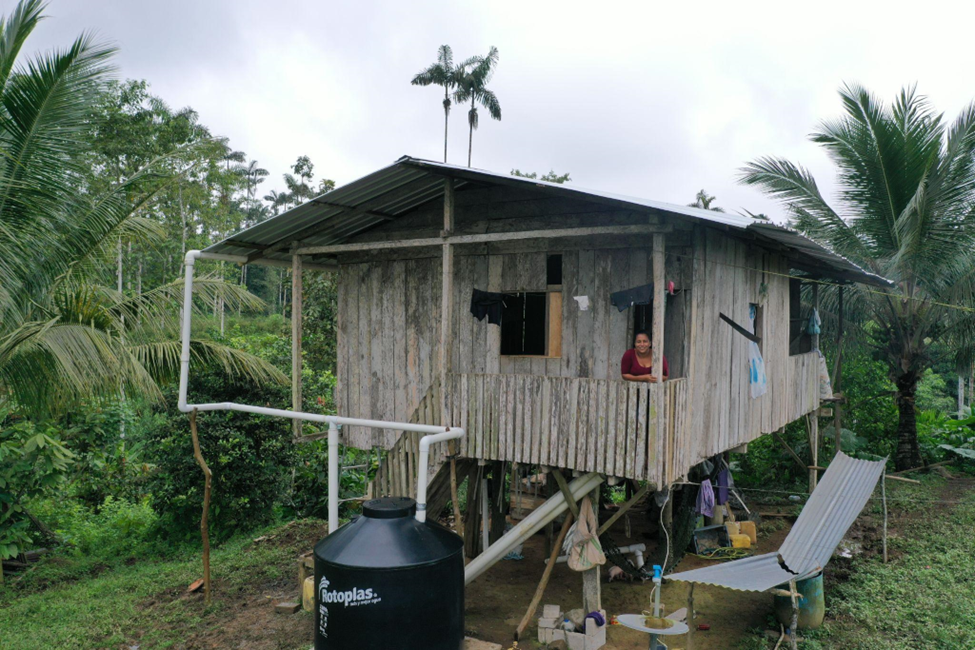Contact:
Greg Edwards
573-201-0936
greg.edwards@mst.edu
For more news: news.mst.edu
ROLLA, Mo. (May 1, 2023) – Missouri University of Science and Technology’s Engineers Without Borders team will soon be on the move and traveling to both Bolivia and Ecuador in May.
“These will be our team’s first international trips since before the COVID-19 pandemic,” says Anna Stephenson, a senior in chemical engineering who is the team’s project lead for the trip to Atahuallani, Bolivia. “It’s something we are all excited about. Our group has volunteered for our projects remotely, and now we will have the opportunity to be in the field.”
For the project in Bolivia, a previous group of students visited in 2019 to meet with the community and conduct a preliminary assessment of the situation in person. Then, students worked remotely with Bolivian engineers to develop and implement a gravity-fed water system for the Atahuallani community to use.
Stephenson says this provided the community with a safer, more readily available source of water. The group’s next goal is to develop a latrine system, which will help with wastewater and potentially lower disease in the community.
“In our upcoming trip, we will conduct the necessary assessments, monitor the current water system, and communicate with local residents through surveys and interviews to collect data about the community’s water usage,” Stephenson says.
Eight students will be part of this trip, as well as two team mentors.
The work conducted in Agua Fria, Ecuador, has also related to clean water sources for local residents.
According to Cylan Burns, a senior in engineering management and multidisciplinary studies who is leading the efforts for the Ecuador trip, S&T’s team visited the country in 2018 and has since worked remotely to develop systems to collect rainwater for residents to use.
Thanks to the team’s efforts, 12 homes, as well as a local school were equipped with these systems.
The next step will be to implement a gravity-fed pipeline for the community to have easier access to clean water from a local river, which should benefit local health and hygiene practices.
Before taking this step, the six students and one team mentor who make the trip will first have to conduct an assessment and see how the situation has changed since S&T’s visit five years ago.
Natalie Wohlgemuth, a senior in civil engineering and the group’s acting president, says all of the students involved are appreciative of the support they receive for their efforts, as these initiatives would not be possible without funding from sponsors and individual donors.
“The donations we receive will truly make an immeasurable difference in the lives of the people we are helping,” she says. “By donating, you are helping with these community members’ basic needs that most people in the United States could not imagine doing without for even a short time.”
Wohlgemuth says S&T’s students take their efforts seriously and understand the impact the projects will have for community members in these countries for generations to come.
“Our members pay for part of their trips out of their own pockets, and they are passionate about working to improve these communities,” she says. “We are developing infrastructure for these communities that will make a real difference for the residents.”
Crowdfunding pages are currently live to contribute to the students’ efforts for both trips. To support S&T’s chapter of Engineers Without Borders, visit crowdfunding.mst.edu.
Students and mentors traveling to Bolivia include:
- Cylan Burns, a senior in engineering management and multidisciplinary studies from Versailles, Missouri
- Cameron Fox, a senior in chemical engineering from Blue Springs, Missouri
- Jack Koller, a senior in chemical engineering from Columbia, Missouri
- Isabelle McGuire, a senior in environmental engineering from Webster Groves, Missouri
- Jacob Muehlher, a junior in civil engineering from Waterloo, Illinois
- Faith Sollars, a senior in chemical engineering from Holden, Missouri
- Anna Stephenson, a senior in chemical engineering from Lee’s Summit, Missouri
- Henry Winfrey, a junior in environmental engineering from St. Louis
- Dr. Kelly Liu, a professor of geophysics
- David Hoffman, a volunteer mentor in the civil, architectural and environmental engineering department
The group traveling to Ecuador includes: - Libby Adams, a senior in architectural engineering and multidisciplinary studies from Bentonville, Arkansas
- Kelton Back, a junior in environmental engineering from St. Louis
- Sophia Brouwer, a senior in mechanical engineering from Mukwonago, Wisconsin
- Cylan Burns, a senior in engineering management and multidisciplinary studies from Versailles, Missouri
- Caleb Cooke, a sophomore in geological engineering from Fort Scott, Kansas
- Hannah Keely, a senior in mechanical engineering from Holts Summit, Missouri
- Dr. Nathan Leigh, assistant director of research for S&T’s chemistry department
-30-
About Missouri University of Science and Technology
Missouri University of Science and Technology (Missouri S&T) is a STEM-focused research university of over 7,000 students. Part of the four-campus University of Missouri System and located in Rolla, Missouri, Missouri S&T offers 101 degrees in 40 areas of study and is among the nation’s top 10 universities for return on investment, according to Business Insider. For more information about Missouri S&T, visit www.mst.edu.
To download full image, right-click and choose “save image as”

Missouri S&T’s Engineers Without Borders organization has worked remotely to implement rainwater catchment systems in Agua Fria, Ecuador. Photo courtesy of Engineers Without Borders.

